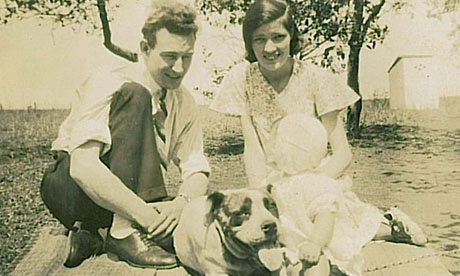
Here we have a memoir, detective story and love letter revolving around a violent alcoholic and paedophile – the author's grandfather. Jimmy's crimes and their repercussions were so horrendous that at times one physically recoils from the page. It is a measure of Emma Brockes's artfulness and sensitivity that she has fashioned her material into an enjoyable narrative.
Brockes's mother, Pauline, emigrated to England from South Africa in 1960 after the Sharpeville massacre: she couldn't stand the politics. She left seven half-siblings (Pauline's own mother died when she was small) and while she was at sea her Afrikaner father died too. Pauline married Brockes's father, a lawyer, and their only daughter enjoyed what sounds like an idyllic childhood in the home counties. Saying things, though, was "construed as weakness", and Brockes knew little of her mother's past.
Then, when she was dying young of lung cancer, Pauline told her daughter the sketchiest of details. She Left Me the Gun reveals Brockes's sleuthing to uncover the rest.
A Guardian staffer whose previous book, What Would Barbra Do?, offered an amusing, memoirish look at how musicals can change your life, Brockes starts by hiring a researcher at the Pietermaritzburg archives. It emerges that, before even fathering Pauline, Jimmy had served time for murder (for killing a man during a robbery). A third of the way through the book, Brockes lands in Johannesburg. Gradually, over the course of two long visits, she meets her surviving relatives, each still suffering in his or her own way. "The ones at the top had it worst, they say, because they had it longest. The ones at the bottom say they had it worst because … they were bullied by the ones at the top." One aunt remembers her father holding a knife to her throat. When good old Jimmy couldn't get a drink he glugged meths strained through bread, injected morphine between his toes, beat up his wife and raped his daughters. The children were eventually installed in a children's home and made to keep a photo of their father by their beds.
Brockes delves into "the wider insanity" of the apartheid era, when Jimmy was busy molesting his children. She reads court papers ("Right you fucker, you can answer to me," she tells her dead grandfather), and discovers that in her mid-20s Pauline had her father arrested for child abuse. "There had been a highly publicised court case," reports Brockes, "in which he had defended himself, cross-examining his own children in the witness box and destroying them one by one." The judge acquitted Jimmy on all charges.
In South Africa, Brockes finds herself instinctively protective of her tribe of cousins, aunts and uncles, just as her mother had been. The surviving siblings' love for Pauline is overwhelming. "Thank you", one brother wrote while his sister was alive, "for those little veins of gold that finally wove their way into everything sacred in my life". Brockes describes her travels around the Western Cape ("The summer has gathered itself up for one final blast and the air is glutinous and distorting"), leavening the mix with lots of yeasty direct speech when family members heave into view. She goes to a casino with an uncle; takes a funny road trip though the Isandlwana battlefields with a girlfriend from home; gets mugged; visits graves in an attempt to draw the family tree. But some of the best passages occur when Brockes conjures her English childhood. In the jeweller's where her mother worked for 19 years, she recalls, "While everything out back was grey and held together by staples, out front it was hot and red and gold, like a royal box at the theatre."
And the gun? Pauline tried to use it to murder her father. She brought it to England and kept it in a secret drawer beneath a bookcase in the guest bedroom and wanted her daughter to have it. But in 1990 she handed it to the police during a weapons amnesty.
One senses, in these pages, that the bereaved Brockes used her quest to hold on to her mother. In a way, the whole volume is a threnody. The author rather cleverly brings She Left Me the Gun to a conclusion with the suggestion that she can now, at last, let go; that horrible man provided a redemption of sorts. I very much enjoyed this book.

